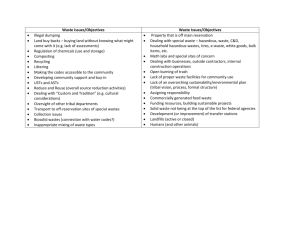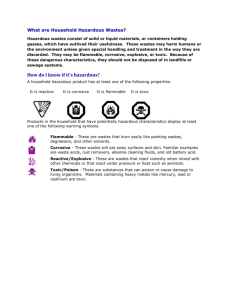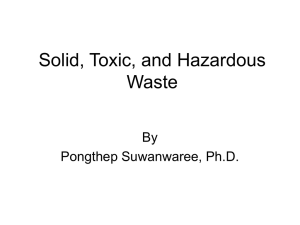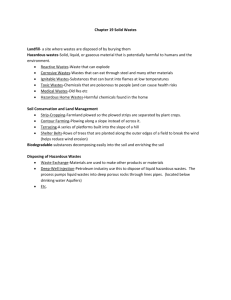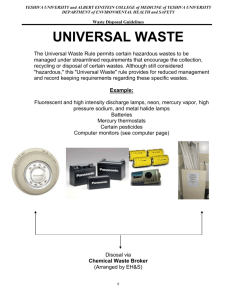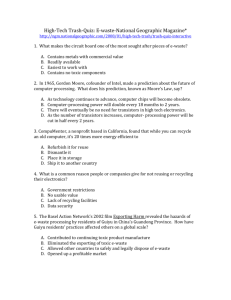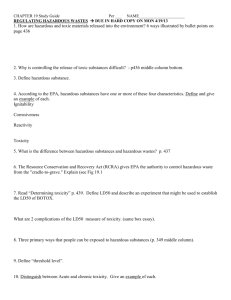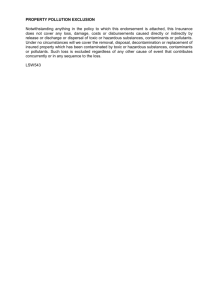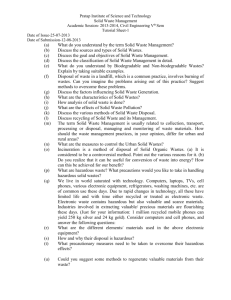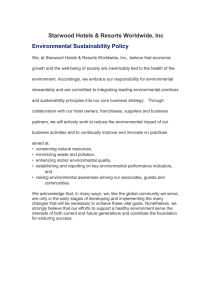1 Republic of the Philippines HOUSE OF
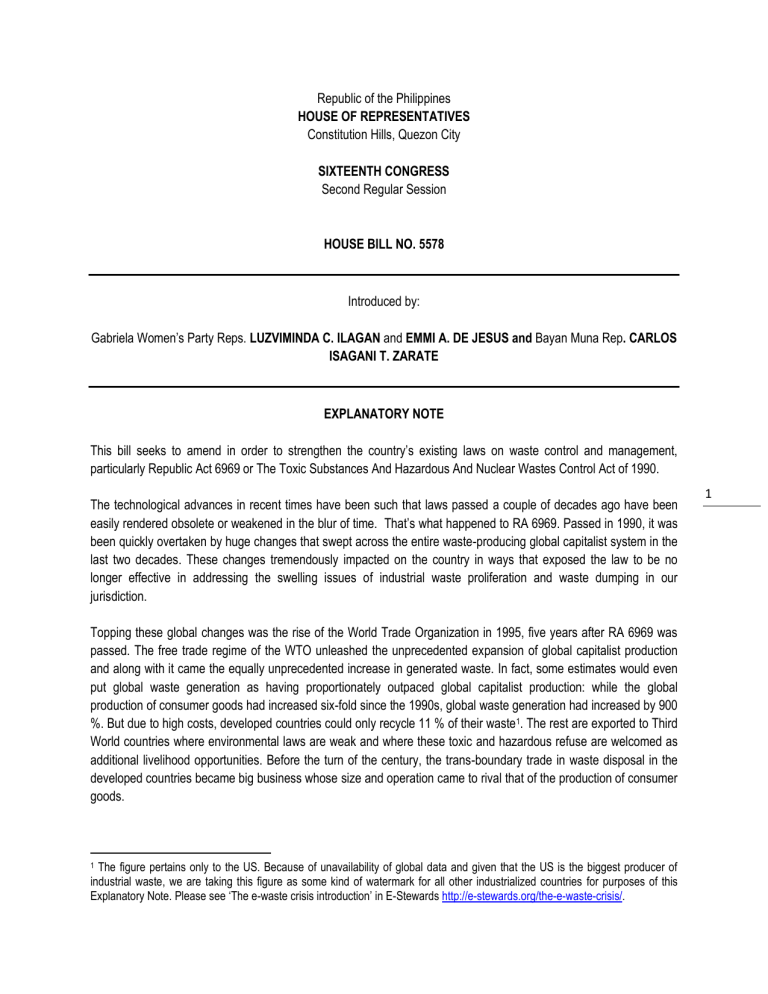
Republic of the Philippines
HOUSE OF REPRESENTATIVES
Constitution Hills, Quezon City
SIXTEENTH CONGRESS
Second Regular Session
HOUSE BILL NO. 5578
Introduced by:
Gabriela Women’s Party Reps. LUZVIMINDA C. ILAGAN and EMMI A. DE JESUS and Bayan Muna Rep . CARLOS
ISAGANI T. ZARATE
EXPLANATORY NOTE
This bill seeks to amend in order to strengthen the country’s existing laws on waste control and management, particularly Republic Act 6969 or The Toxic Substances And Hazardous And Nuclear Wastes Control Act of 1990.
The technological advances in recent times have been such that laws passed a couple of decades ago have been easily rendered obsolete or weakened in the blur of time. That’s what happened to RA 6969. Passed in 1990, it was been quickly overtaken by huge changes that swept across the entire waste-producing global capitalist system in the last two decades. These changes tremendously impacted on the country in ways that exposed the law to be no longer effective in addressing the swelling issues of industrial waste proliferation and waste dumping in our jurisdiction.
Topping these global changes was the rise of the World Trade Organization in 1995, five years after RA 6969 was passed. The free trade regime of the WTO unleashed the unprecedented expansion of global capitalist production and along with it came the equally unprecedented increase in generated waste. In fact, some estimates would even put global waste generation as having proportionately outpaced global capitalist production: while the global production of consumer goods had increased six-fold since the 1990s, global waste generation had increased by 900
%. But due to high costs, developed countries could only recycle 11 % of their waste 1 . The rest are exported to Third
World countries where environmental laws are weak and where these toxic and hazardous refuse are welcomed as additional livelihood opportunities. Before the turn of the century, the trans-boundary trade in waste disposal in the developed countries became big business whose size and operation came to rival that of the production of consumer goods.
1 The figure pertains only to the US. Because of unavailability of global data and given that the US is the biggest producer of industrial waste, we are taking this figure as some kind of watermark for all other industrialized countries for purposes of this
Explanatory Note. Please see ‘The e-waste crisis introduction’ in E-Stewards http://e-stewards.org/the-e-waste-crisis/ .
1
It’s a business that mimics the pattern of the trade imbalance between the developed and developing countries, with the stream of waste disposal running from the North to South. This has led to what some environmentalists call as
‘garbage imperialism’ 2 to describe a global production system in which developing countries have been relegated to the economic niche of being the waste dump of the developed countries in addition to being the dumping ground of the latter’s finished industrial products.
Second is the speeding train of technological revolution in the last three decades which has given rise to an eruption of new if not growing forms of toxic and hazardous wastes. Among these growing forms of waste are the refuse, called the e-waste (waste electrical and electronic equipment or WEEE), that have been the end result of the explosion of the computer, internet and electronic gadgets technology that started in the 1990s. These consist of broken computers and laptops, outdated cell phones, mp3s, play stations, printers, fax machines, and copiers.
Although they came under the definition of ‘hazardous waste’, they had not yet reached the ‘end-of-life’ problem they have reached today that they were hardly in the radar of RA 6969 and other local environmental laws. In addition to televisions, air-conditioners and refrigerators, they constitute about 70 % of the industrial waste that developed countries dumped to Third World countries. Since these products are propelled by the ‘law of dynamic obsolescence’ which entails rapid and never-ending upgrading, it generates 25 - 40 million tons of global waste a year that annually grows by 8 % since 2000 3 that environmentalists are seeing in these number surges an environmental disaster waiting to happen.
These global developments broke down the defenses that RA 6969 tried to erect around our environment. Thus, despite the passage of RA 6969, the country continues to be one of the leading destinations of chemical products and toxic substances from developed countries where these products and substances are in fact banned. The
Philippines remains as one of the leading importers of ‘persistent organic pollutants’ (POPs) which are continually applied in our agricultural lands, poisoning our rivers, lakes and seas. In addition, scrap lead acid batteries from industrialized nations particularly United States, Australia, United Kingdom, Canada and Germany have continually entered the country. From 1990 to1993, some 64,000 tons of toxic waste were shipped to the Philippines, with over
27,000 tons coming from Australia. In 1995, Philippine authorities seized 122 forty-foot containers carrying infectious medical wastes from Japan. Additionally, in 1999, a Japanese firm shipped 2700 metric tons of wastes for disposal to the Philippines. Labeled as paper for recycling, the wastes in fact were a mix of hazardous medical and industrial wastes unsuitable for recycling. From 2001 to 2005, up to 1.2 million second-hand TVs, refrigerators, washing machines, and air conditioners were estimated to have entered the Philippines, of which 60 to 70 percent came from
Japan. Recently, environmentalists have raised alarms over the possibility of waste traders using recycling as a
2
2 Kenyon Rainier Stebbins, ‘Garbage Imperialism: Health implications of dumping hazardous wastes in third world countries’ in
Medical Anthropology: Cross-cultural Studies in Health and Illness, Vol. 15, Issue 1, 1993; please also see Michael Cohen,
‘Toxic Wastes and the New World Order’ in The Third World Traveler, http://www.thirdworldtraveler.com/Environment/ToxicWaste_NewWorldOrder.html
(visited 09/30/13). Cohen’s article traces the journey of the infamous barge Khian Sea that left Philadelphia with its cargo of 14,000 tons of toxic incinerator ash in search of a recipient country and finding none dumped it in the Indian Ocean.
3 The low end of the figure is from SomjitaLaha, Transboundary Toxic E-waste Flow: Environmental Injustice Through Neoecological Imperialism ( http://www.iss.nl/fileadmin/ASSETS/iss/Documents/Conference_presentations/NatureInc_ Somjita_
Laha.pdf
), visited 09/30/2013. The high end is from Science Daily, ‘Hazardous e-waste surging in developing countries’,
02/23/2010.The figure on the yearly growth of e-waste is from ‘The e-waste crisis introduction’ in E-Stewards http://estewards.org/the-e-waste-crisis/ .
vehicle to camouflage waste dumping in the country when early this year, the Bureau of Customs uncovered domestic thrash declared as recyclable plastics shipped in 50 container vans from Canada.
4
RA 6969 was further weakened when the country entered into several multilateral and bilateral free trade agreements following the collapse of the 1999 WTO negotiations in Seattle, USA. Among these agreements was the Japan-
Philippines Economic Partnership Agreement (JPEPA) which contains a provision allowing the entry of Japanese hospital waste into the country in exchange of employment opportunities for Filipino nurses in Japan. In addition, despite the non-renewal of the US-PH Military Bases Agreement in 1991, the country has continued to serve as a strategic base of US military operation in the Asia-Pacific rim which is pregnant of the possibilities that the US might be dumping her military waste in the country but shrouded by a ‘neither confirm nor deny’ policy. In fact, the most recent incident of waste dumping in the country involved a company, the Glenn Defense Marine Asia Co., contracted by the US navy to dispose military waste from US war ships docked in Subic.
Apart from these external factors, RA 6969 also suffers from birth defects that somehow blunted its effectiveness in dealing with waste dumping in the country. Foremost of these intrinsic defects was that it labored under the framework idea that environmental protection laws should not be a ‘restraint to trade’, an idea that dominated the decade that launched the globalization of the WTO. Proceeding from such framework, RA 6969 stopped short of possessing those provisions that would have given Philippine authorities the teeth to purposefully prevent waste dumping in the country and make the law truly a deterrent to acts of endangering the health of our people and of poisoning our environment. Specifically, the law shied away from using the state’s sovereign powers to prohibit the importation of chemicals and chemical products that are banned in their country of origin or targeted for elimination, due to their proven harmful effects, by international conventions. RA 6969 leaned more on the side of control and management resulting in weak provisions against waste dumping.
Exemplifying this inherent weakness is the law’s penal provisions which, as aptly observed by no less than DENR
Secretary Ramon Paje, are so light that they do not at all have exemplary deterrent effects 5 . Another case in point is
RA 6969’s provision on stopping in transit those vessels that are bringing toxic, hazardous or nuclear wastes into the country. Notwithstanding the good intention, it lacked the pre-entry inspectorial mechanism for authorities to prevent the landing and entry of toxic and hazardous wastes into Philippine territory.
Moreover, although the Philippines was already a signatory to the Basel Convention when the law was passed, RA
6969 failed to incorporate the Convention’s ‘extended producer responsibility’ principle. As a result, the law, right off the starting mark, did not have the proverbial long hand to reach out to the ultimate source of waste proliferation and dumping and this created a gaping hole in the enforcement even of waste management and disposal in the country.
With the country’s 48 million cell phone users and 12 million PC users, exponentially increasing from 10 million and 2 million respectively in the 1990s, this gaping hole is fast turning into an environmental nightmare.
In addition to environmental effects, various studies have shown that toxic and hazardous wastes, because of the heavy metals they contain, are risks to human health and life. They can cause a wide range of diseases, infections and injuries that can lead to death, and permanent or temporary disability. Even low-level exposure to these wastes may lead to slow-progressing but fatal diseases such as diseases affecting the lungs and the liver.
6 Other focused studies have also shown the adverse effects of such wastes on women and children. Exposure to toxic and hazardous wastes has been linked to the considerable occurrence of asthma, breast cancer and hormonal imbalances among women, as well as miscarriage and intrauterine growth infection among pregnant women.
4
5
6
Philippine Daily Inquirer, ‘Group slams shipment of toxic waste from Canada’, 02/14/2014.
The observation was made by Sec. Paje in response to the interpellation by one of the authors, Rep. Luzviminda C. Ilagan, during the appropriation committee deliberation of the 2014 DENR budget last August 2013.
Calin Georgescu, ‘Report of the Special Rapporteur on the adverse effects of the movement and dumping of toxic and dangerous products and wastes on the enjoyment of human rights’. United Nations Human Rights Council, 04 July 2011, p. 8.
3
Children of mothers exposed to toxic and hazardous wastes were also observed to have suffered low birth weight, preterm birth, birth defects and delay in motor and cognitive development.
7
Given its inherent weaknesses and the challenges to human health and environmental protection that arose after RA
6969 was enacted, the law is badly in need of, to use the language of present-day techie crowd, a major upgrading.
Such is the purpose of this bill. It seeks to upgrade RA 6969 and other domestic laws on waste control and management through the following: a) It discards the framework idea that environmental laws should not be a ‘restraint to trade’. Such an idea, which dominated the globalization-obsessed 1990s and animated the crafting of RA 6969, has been proven to be toxic and dangerous to the well-being of mankind and his already deteriorating environment. In place of such framework, this bill upholds the contrary idea that emerged as an international reaction to the unbridled free trade regime of the WTO – the idea that harmful trade cannot be a legitimate human activity and has no place in international and domestic interaction among peoples and economies. Where trade becomes harmful to man and his environment, such activity must be interdicted with prohibition. b) This bill embraces environmental justice, the concept that the stream of waste from the developed countries to Third World countries will only unjustly perpetuate the underdevelopment of the latter and should be stopped. c) It also embraces the ‘precautionary’ principle of the 1992 Rio de Janeiro Declaration. Where scientific proofs are inconclusive as to the harmful effects of an act, development project or chemical substance, this bill errs on the side of precaution. d) It also adopts the ‘extended producer responsibility’ principle of the Basel Convention of which the country is a signatory, including the Basel Ban on trans-boundary trade of toxic waste, including e-waste, and hazardous products; e) This bill incorporates our commitment to the Minimata Convention on Mercury which is working toward the eventual elimination of the use of mercury; and f) It calibrates the administrative and judicial penalties for violations of RA 6969 to make such penalties truly a deterrent to waste dumping in the country.
If we are to prevent an environmental nightmare in this country, this bill should be passed with dispatch.
LUZVIMINDA C. ILAGAN EMMI A. DE JESUS
Gabriela Women’s Party Gabriela Women’s Party
CARLOS ISAGANI T. ZARATE
Bayan Muna
7 Harrison E, Partelow J, Grason H., Environmental Toxicants and Maternal and Child Health: An Emerging Public Health
Challenge, John Hopkins Bloomberg School of Public Health, 2009.
4
Republic of the Philippines
HOUSE OF REPRESENTATIVES
Constitution Hills, Quezon City
SIXTEENTH CONGRESS
First Regular Session
HOUSE BILL NO.__________
Introduced by:
Gabriela Women’s Party Reps. LUZVIMINDA C. ILAGAN and EMMI A. DE JESUS and Bayan Muna Rep . CARLOS ISAGANI T. ZARATE
AN ACT PROHIBITING WASTE DUMPING AND
STRENGTHENING THE EXISTING SYSTEM OF WASTE CONTROL AND MANAGEMENT
IN THE COUNTRY, THEREBY AMENDING SECTIONS 4 (b), 13, 14 a) i, AND 15
OF REPUBLIC ACT 6969, AND FOR OTHER PURPOSES
Be it enacted by the Senate and the House of Representatives of the Philippines in Congress assembled :
Section 1. Statement of State Policies and Principles.
– The State adheres to the policy that protecting the environment from further degradation and destruction is vital to the highest degree to promoting the well-being of the
Filipino people. In pursuance of this policy, the State hereby adopts and implements through this Act the principles and agreements of certain international conventions to which the country is a signatory and has committed compliance. These principles are: a) The principle of the Basel Ban Amendment which enunciates the prohibition of trans-boundary trade in toxic and hazardous wastes; b) The principle of ‘extended producer responsibility’ of the Basel Convention; c) The ‘precautionary’ principle of the 1992 Rio de Janeiro Declaration; and the d) The principle of commitment to the Minimata Convention on Mercury which is working toward the eventual elimination of the use of mercury;
Section 2. Section 5 of Republic Act No. 6969 is hereby amended to include the following :
Dumping – the act of transhipping into Philippine waters and soil those toxic substances, hazardous and nuclear wastes, e-waste and other similar materials whose transhipment is prohibited by international conventions to which the country is a signatory; also, the act of disposing toxic substances, hazardous and nuclear wastes, and e-waste in violation of Republic Act 6969 and of Sections 5, 6, 7, and 8 of this Act;
5
Electrical products – refers to products, appliances, or tools whose operation relies on electricity and thereby contain wiring systems made of heavy metals such as lead, mercury, cadmium, beryllium, polyvinyl chloride, organotins, and brominated flame retardants;
Electronic products – refers to products, equipment, or gadgets whose operation relies on the convergence of digital and computer technology and also thereby contains heavy metals such as lead, mercury, cadmium, beryllium, polyvinyl chloride, organotins, and brominated flame retardants;
End-of-life – refers to the condition when a product reaches the end of its supported useful cycle because the period for the supply of the support system and services for the product provided by its manufacturer or distributor/seller has terminated or ended;
E-waste – refers to electrical and electronic products that have reached their ‘end-of-life’ cycle. Such products are considered hazardous wastes as defined in Section 5 (g) of RA 6969; and
Military waste – are wastes produced by equipments and instruments principally used in military purposes;
Section 3. Absolute prohibition of military and nuclear waste and inspectorial powers . – In furtherance of the
State Policy of freedom from nuclear weapons in our territory, the entry and dumping of foreign nuclear and military waste shall be absolutely prohibited. Thereby, a) Any nuclear or military waste produced while basing in the country shall be shipped out to the homeland of the foreign military force; b) Before leaving its base of origin, the captain of the vessel or the wing commander of the aircraft of such foreign military force shall issue a certification addressed to the Secretary of Foreign Affairs that categorically states that said vessel or aircraft bound for the Philippines carries no nuclear or military waste; c) The vessels and aircrafts of such foreign military force shall be subject to boarding and the exercise of inspectorial powers by Philippine authorities; and d) The captain of the vessel or wing commander of the aircraft who causes the entry of nuclear or military waste into the country or who fails to prevent such entry shall be subject to criminal prosecution under
Philippine laws;
Existing treaties and executive agreements inconsistent with this Act are hereby repealed or amended in accordance with this Act.
Section 4. Enforcement of the Basel Ban Amendment in the country – In compliance with the Philippine commitment to the Basel Ban Amendment, the importation or transhipment into the country of all hazardous wastes as defined in RA 6969, as amended by this Act, is hereby prohibited.
Section 5. Extended producer responsibility . – In compliance with the Philippine commitment as signatory to the
Basel Convention, it shall be the responsibility of manufacturers and producers to track, recover, recycle and dispose their electrical and electronic products in accordance with this Act, its Implementing Rules and Regulations and other
Philippine environmental laws.
6
Section 6. Devolution of EPR to domestic distributors and marketing agents . - In the case of manufacturers and producers of electrical and electronic products not based in the Philippines and whose country of operation does not follow the EPR principle, their responsibilities and liabilities that arise from Section 4 hereof shall devolve upon their domestic distributors and marketing agents.
Section 7. Window period for manufacturers and producers . - Manufacturers and producers of electrical and electronic products, or their domestic distributors and marketing agents, shall be given twelve (12) months from the effectivity of this law to design a system and mechanism for tracking, recovering, recycling their products and for disposing their e-waste as mandated by the preceding section.
Section 8. Prohibition of importation of products that have reached ‘end-of-life’. The importation of electrical and electronic products that have reached the ‘end-of-life’ is prohibited. The importers of such products shall issue a certification that their goods have not yet reached the ‘end-of-life’ and such certification shall form part of their importation documents to be submitted to the Bureau of Customs and the Department of Trade and Industry.
Section 9.
Compliance to the Minimata Convention . – In compliance with the Philippine commitment as signatory to the Minimata Convention, the importation/manufacture, sale, handling, storage, transportation, distribution, use or possession of mercury shall be hereby strictly prohibited. All persons, companies and enterprises engaged in economic activities involving the use of mercury are hereby given a window period of one (1) year within which to phase out such use and to replace it with appropriate technology.
Section 10. Observance of the ‘precautionary’ principle of the 1992 Rio de Janeiro Declaration . - In all cases of determining whether an act, development project or chemical substance is harmful to the health of the Filipino people and the environment, the precautionary principle shall be observed.
Section 11. Right to information . All documents related to implementing this Act, especially those mentioned in
Section 3, paragraph b) and Section 7, shall be considered a public document to which any interested citizen shall have access to information.
Section 12 Right to citizen’s suit. Any citizen not otherwise disqualified by law may file a complaint or suit against any person or corporation for acts or conduct in violation of the provisions of this Act, or against any government agency or official for failure to perform their function or duty as mandated in this Act;
Section 13. Creation of a National Implementation Plan Task Force.
- There is hereby created a National
Implementation Plan Task Force (NIPTF) which shall have the principal task to design a National Implementation
Plan for achieving the policies and enabling provisions of this Act. The Task Force shall be headed by the
Department of Environment and Natural Resources shall have the following composition: a) The Secretary of the Department of Environment and Natural Resources – Chairman b) The Secretary of the Department of Science and Technology - Member c) The Secretary of the Department of Health - Member d) The Secretary of the Department of Trade and Industry - Member e) The Secretary of the Department of the Interior and Local Government - Member
7
f) The Secretary of the Department of Foreign Affairs - Member g) Three (3) Representatives from NGOs and POs with proven ten years experience in environmental protection advocacy and work - Members
Section 14.
Period to finish the implementing design and IRR . - The NIPTF shall finish the design of the NIP, including its Implementing Rules and Regulations, within six months after the effectivity of this Act. A copy of the NIP shall be submitted to the Joint Congressional Oversight Committee for this Act.
Section 15. Further amendments to RA 6969.
1) Section 4 (b) of RA 6969 is hereby amended to read as follows:
Section 4. Objectives - The Objectives of this Act are:
(b) to prohibit and monitor the importation, manufacture, processing, handling, storage, transportation, sale, distribution, use and disposal of chemical substances and mixtures that present unreasonable risk or injury to health or to the environment in accordance with national policies and international commitments;
2) Section 13 (a) of RA 6969 is hereby amended to read as follows:
Section 13. Prohibited Acts – The following acts and omissions are considered unlawful: a). Knowingly importing or manufacturing chemicals, chemical mixtures or chemical products which are prohibited under this Act or knowingly using chemical substance or mixture which is imported, processed or distributed in violation of this Act or implementing rules and regulations or orders;
3) Section 14 a) (i) of RA 6969 is hereby amended to read as follows:
Section 14. Criminal Offenses and Penalties – a) (i) The penalty of imprisonment of six (6) months and one (1) day to six (6) years and one (1) day and a fine ranging from Five Thousand (P5,000) Pesos to Fifteen Thousand Pesos (P15,000) shall be imposed any person who violates Section 13 a) to c) of this Act and such person shall not be covered by the Probation Law. If the offender is a foreigner, he or she shall be deported from the Philippines and barred from any subsequent entry into the Philippines after serving his or her sentence.
4) Section 15 of RA 6969 is hereby amended to read as follows:
Section 15. Administrative Fines. – In all cases of violations of this Act, including violations of implementing rules and regulations which have been duly promulgated and published in accordance with Section 12 of this Act, the Secretary of the Department of Environment and Natural Resources is hereby authorized to impose a fine of not less than Fifteen Thousand Pesos (P15,000) but not more than Seventy-five
Thousand Pesos (P75,000) upon any person found guilty thereof. If the violator is a company with a capital of above Five Hundred Thousand Pesos (P500,000), the fine shall not be less than Seventy-
8
five Thousand (P75,000) but not more than Three Hundred Thousand Pesos (P300,000).
The administrative fines imposed and collected by the Department of Environment and Natural Resources shall accrue to a special fund to be administered by the Department exclusively for projects and research activities related to improving the control and management of toxic substances and hazardous wastes.
Section 16. Joint Congressional Oversight Committee . – The House Committee on Ecology and the Senate
Committee on Ecology are hereby constituted as a Joint Congressional Oversight Committee for this Act. The committee shall meet once every six months or as the need arises to monitor and review the implementation of this
Act.
Section 17. Separability clause . - If any part or provision of this Act is declared void or unconstitutional, the remaining provisions thereof not affected thereby shall remain in full force and effect.
Section 18. Repealing clause.
- All laws, presidential decrees, executive orders and issuances, and rules and regulations which are inconsistent with this Act are hereby repealed or modified accordingly.
Section 19. Effectivity clause . - This Act shall take effect after fifteen (15) days following its publication in the
Official Gazette or in any newspaper of general circulation.
9
